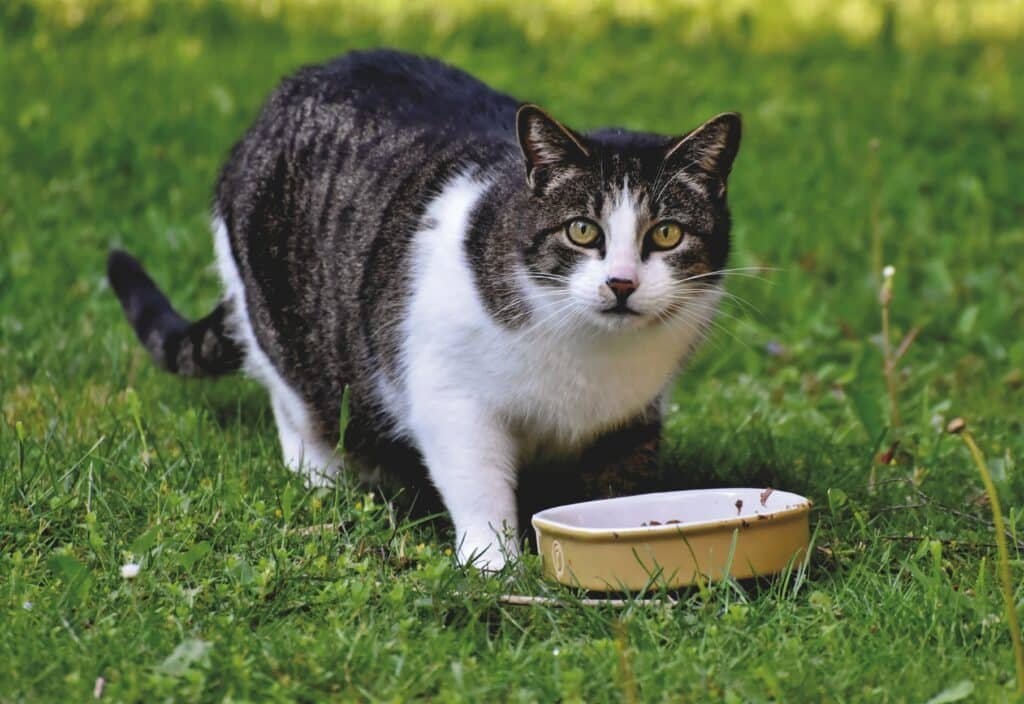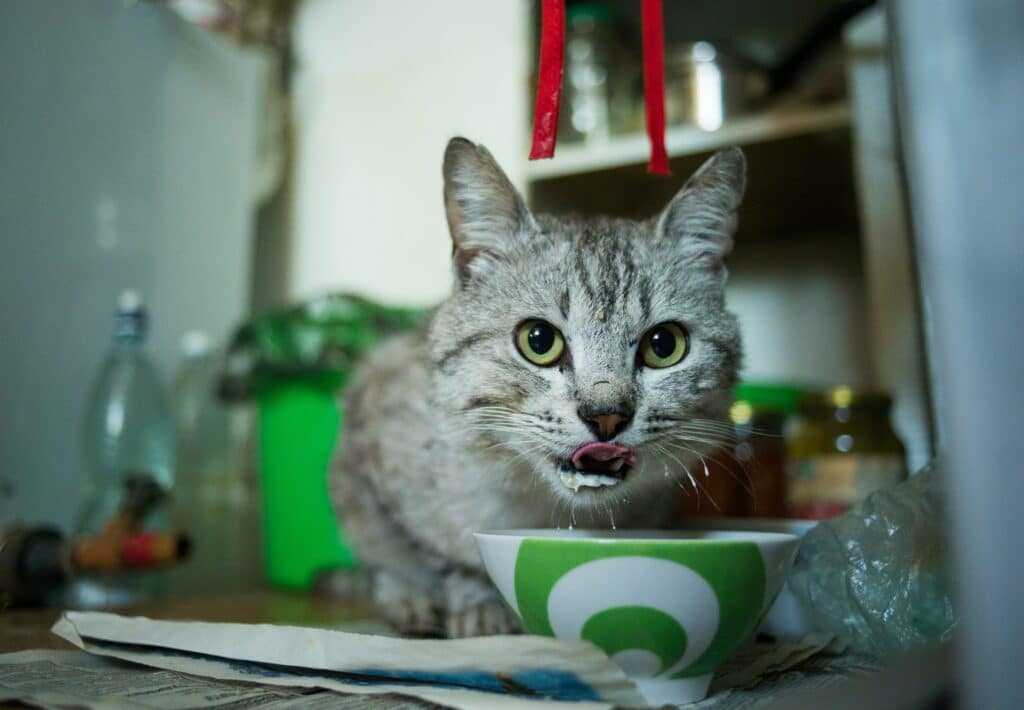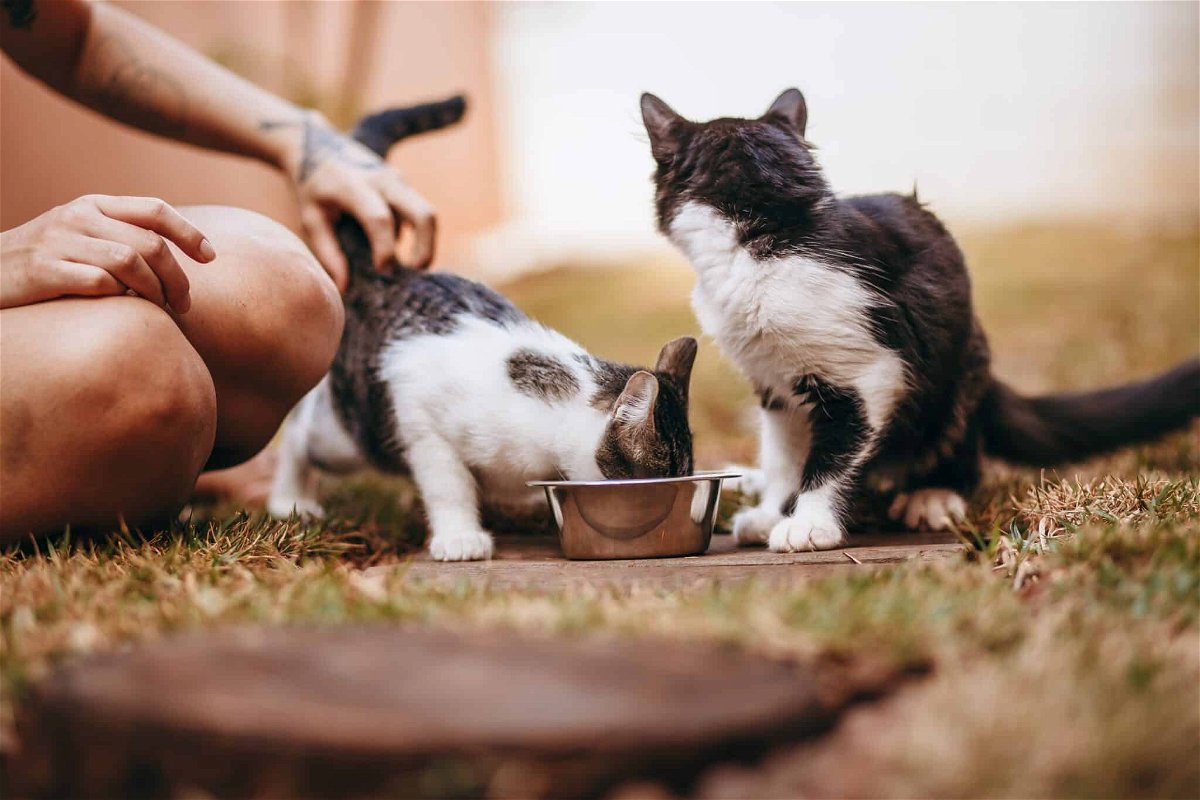We're an affiliate
We hope you love the products we recommend! Just so you know, we may collect a share of sales or other compensation from the links on this page at no additional cost to you. Thank you if you use our links, we really appreciate it!
As a cat parent, you may have noticed that your cat is almost fully hooked on your presence during mealtime. This might make you wonder ‘why does my cat want me to watch her eat?’
While the behavior might seem strange to you, it is quite normal for cats. There are various reasons why your lovely feline finds it hard to eat when you’re not there.
Cats can be complex creatures and unless we decode their puzzling behaviors, we might be left wondering aloud without any hint every time they do something odd.
Keep reading this post to discover some of the reasons why your cat craves your presence as they eat and what you can do to tone down this behavior.
Why Do Cats Want You to Watch Them Eat?
1. Cats are both predators and prey
Cats are predators by nature and they can become prey as well. They will always look out and investigate their surrounding before getting comfortable.
Cats eat while facing down with full concentration on what’s in their food bowls.
This is a dangerous position that exposes the feline to attack by another animal who could sneak in and snatch their food.

If you have a cat who can only eat when you watch over them, then it’s because they feel safe to do so in your presence.
Your cat will therefore rely on you to watch over their surrounding and prevent other animals from interrupting them.
2. Your cat is social
Your feline friend might be one of those interactive pets who thrive being in the company of others during enjoyable moments.
The cats’ ancestors in the wild would hunt in groups and eat together as a pack. This is an inborn instinct that has transcended down to our felines at home.
They don’t enjoy scarfing down their meals alone and your company seems to be the most valuable for them.
3. Your cat trusts you
Cats would use their mealtime as a great way to establish a social hierarchy within their pack. Your feline friend might be making indications that they trust you as their leader by eating only when you see them do so.
This behavior is particularly strong among cats who have established formidable emotional and social attachments with their owners.
4. It’s a habit
Cats are known to form habits with repeated actions. Your lovely feline might be uncomfortable eating alone because their breeder formed a tendency of feeding them while nearby.
This includes placing their food bowls around your dining table or in places frequented by other family members.
They have since learned that meals are supposed to be eaten when their owner is close by and it’s a habit that can’t seem to let go of.
5. It’s a sign of separation anxiety
Cats who have been pre-weaned from their mothers are likely to develop separation anxiety syndrome when they transition into adulthood.
Such cats may refuse to eat totally and even lose their appetite when they discover that you are no longer with them during mealtime.
They will always crave their owner’s attachment by seeking assurance of your presence in their lives.
Cats with this syndrome are also too stressed to have the appetite for eating without seeing someone they love.
If you think that your cat is suffering from separation anxiety, you need to address their concerns fast enough before they develop behavioral issues.
6. They want to be petted
Some cats would want to be petted and stroked as they chomp down their favorite foods.
Those gentle strokes and smooth massage on their back are a reassurance of your love for them and it gives them a calming mood while eating.
Some cats will also increase their appetite when you touch them gently as they eat. Remember that cats are highly territorial and some of them will not allow you to take a bone from them as they eat.
Be cautious when petting your cat during mealtime and avoid dipping your fingers in their food bowls.
7. It’s a sign of love
During their tender years, kittens would pass their love to their mothers when they suckle milk and share a bowl of food with them.
Since you are now the special companion in their lives, your lovely kitty will consider it a sign of love when you watch them eat.
This makes them munch their dinner while feeling at ease knowing that they have someone who loves them at home.
My Cat Won’t Eat Unless I Am There, What Should I Do?
If your cat cannot eat unless they see you, then it may become a concern that risks their health when they reduce their food requirement. But there are several things that you can do to help this situation:
1. Move away after your cat starts eating
Put the food in the food bowl, and move away slowly from your kitty’s presence the moment they start to chow it down.
You can just take some steps backward within the same room while observing them from a distance.
Of course, your furry friend will realize that you’re not so close to them, but this trick can work in restoring their confidence during mealtime.
2. Leave the room
The other thing you would love to try is leaving your cat alone in the room after giving them their dinner.
You can be bold enough and walk out as your cat sees you, but sometimes they might be triggered to follow you out of the room.
But if the cat’s appetite is high and they’re fronted with their favorite meal, then it is most likely that they will start eating first without waiting for you to come back.

During the first instances of trying this trick, your affectionate eater will most likely follow you after they realize that they’re alone in the room.
Do this repeatedly and your kitty will slowly appreciate the fact that it is not a must that you be there for them to enjoy their meals.
3. Engage more with your cat
Some cats would want their owners to watch them eat because they don’t receive enough interactions throughout the day.
They use mealtimes to solicit your attention and even request petting.
Make sure to slot in some time each day to engage with your cat either through playing, petting, or doing what they enjoy most.
By spending quality time with your feline friend, you are giving them the attention and affection they so desire to become secure and confident in your house.
This happy mood will translate into their mealtimes where they will be more willing to chomp down their food even in your absence.
How To Stop Affectionate Eating in Cats
Changing a cat’s behavior is something that you can do but it calls for your patience and consistency in whatever you do.
With practice and a few modifications in your daily routine, you can convince your gorgeous feline to eat their meals without you being around.
1. Use an elevated food bowl
Raised food bowls can be ideal for cautious cats who are worried about their surrounding while eating. The elevation gives them a view of the sides as they eat so they can be able to see any oncoming danger.
You can also lift your cats feeding position by placing their ordinary food bowls on a raised counter such as the tabletop or placing them on a cat tree.
Being natural predators, cats would love to eat from high places where they can see their territory from above.
2. Find the right feeding spots
Another simple solution will be to find the perfect areas where you will place your cat’s food bowls. If your cat is very watchful of their immediate environment, then you should place their bowls in an open area that gives them a clear all-round view, where they can even knead the floor before eating.
Placing the bowl near the wall for such cats might not be ideal since the barrier adds to their insecurity by making them feel cornered or trapped by an opponent.
You should instead look for the sweet spots where your cat loves spending most of their time, away from obscure barriers like high walls.
3. Install more feeding areas
Invest in extra food and water bowls to give your cat plenty of feeding spots around your house. This will make your lovely kitty feel more secure with the confidence of choosing their most preferred feeding point.
A feeding area doesn’t have to be too complicated. Just add one small bowl in every room that your cat loves to freely visit.
If you have multiple cats in your home, it’s ideal to invest in separate feeding areas to reduce the chances of confrontation between them and to boost their confidence in their own little spaces.
4. Make your cat feel safe at home
There are several triggers that might stress your cat such as moving houses, welcoming a newborn, changing the house layout, or bringing a new cat home.
In such cases, your lovely kitty will be stressed and may not be willing to freely eat, more so when you’re not there.
You should start by figuring out the triggers that disturb your cat and eliminating them as quickly as possible.

You can also teach your cat to adjust and live with some of the things that stress them. Like helping them to settle in a new house, or introducing a newborn to them progressively.
Maintaining a predictable routine for your lovely feline also helps in toning down their stress levels and insecurity.
Always remember to enrich your cat’s environment by providing them with accessories and activities to fight boredom and destructive behavior such as toys.
5. Consult an animal behaviorist
If your cat can’t seem to ever stop eating without you being around, even after trying out the above solutions, then it is best to contact an animal behaviorist.
These experts in feline behavior and behavior modification will assess your cat and look for the root of their problem, then recommend a procedure to work out a solution.
FAQs
1. Why do cats want you to walk them to their food?
If your furry friend expects you to walk them to their food, then it can be because you have formed this routine before and it has become a habit.
Another reason could be that the cat needs some sense of safety and comfort as she prepares to eat their food.
By your presence in the feeding spot, your tabby knows that other pets will be reluctant to snatch their favorite foods from them.
2. Why does my cat want me to pet him as he eats?
Some cats may want to be petted or stroked as they eat as a way of showing appreciation and affection to you – the meal provider.
The gentle strokes and smooth massage on their coat also provide stimulation that may increase their appetite to enjoy eating their food.
Whereas it is generally safe to pet your cat as they eat, we encourage you to do so gently to avoid overstimulating the cat during mealtimes.
3. My cat won’t eat unless I hand-feed him, what should I do?
You may have developed this behavior in your cat unknowingly when you hand-feed them those special treats and tasty meals like tuna.
The cat must have slowly learned that your hand is the source of better things compared to the bowl. And as a result, they will only be satisfied if you offer them food by hand.
Some cats may also use this behavior to solicit attention from their owner. Make sure to set aside quality time each day to engage with your lovely kitty and give them attention and love.
You can start weaning your cat off this behavior by putting all their food in a bowl and encouraging them to eat from there.
4. I tried the suggested solutions but I can’t get my cat to eat alone, what should I do?
When a cat is healthy and hungry, it is expected that they should eat some food in whichever form it is presented in.
If this behavior persists despite trying different solutions, then you should speak to your vet for medical examination and personalized treatment.
If your cat is found to be in good health, your vet may then recommend an animal behaviorist to diagnose and work out some training procedures to help in adjusting your cat’s behavior.
Conclusion
Now that we explained the reasons why your cat wants you to watch her eat, we can conclude that the most common explanations are due to their need for security, affection, and attention.
Even though you can appreciate this behavior and use it to connect with your lovely kitty, you should be careful not to let them fully rely on your presence during mealtime.
Make sure to observe your cat’s behavior and look out for some warning signs of physical, mental, or emotional disorders.

Justus is the lead author at Furs'n'Paws. He is not only a passionate animal lover but also an experienced pet writer and editor with several years of expertise in the field. With a keen understanding of animal behavior and a talent for interpreting the puzzling body movements of pets, he has developed a deep passion for sharing his insights and experience with his readers. Justus is experienced in researching and reviewing pet products, and putting together product reviews and buying guides. He is dedicated to helping pet owners provide the best for their furry companions. His wealth of knowledge and love for animals make him a trusted resource in the pet community.



No responses yet